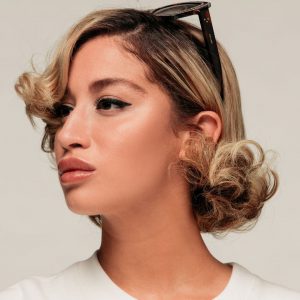 Fatima Zahra is a late-blooming artist, but she’s already attracting a lot of attention in Europe, thanks to a voice that rivals those of Edith Piaf or Barbara Streisand. Known under her alias, La Zarra, the young woman based in Longueuil (a South-shore Montréal suburb) has been signed by Universal Music Canada and Polydor France, and her debut album Traîtrise (Treachery) will be launched Dec. 3, 2021.
Fatima Zahra is a late-blooming artist, but she’s already attracting a lot of attention in Europe, thanks to a voice that rivals those of Edith Piaf or Barbara Streisand. Known under her alias, La Zarra, the young woman based in Longueuil (a South-shore Montréal suburb) has been signed by Universal Music Canada and Polydor France, and her debut album Traîtrise (Treachery) will be launched Dec. 3, 2021.
“I can’t really explain the success I’ve had these last months,” says Zahra, who seems a little bewildered, because although she’s always harboured a deep interest in music, she was actually pursuing another career path.
“Until very recently, I was a hairdresser,” she says. “Those years of experience were really helpful. I fine-tuned my ears listening to Barbara [Streisand] while I worked. I’ve never taken singing lessons or vocal coaching, and I can’t answer when people ask what key I’m singing in,” she giggles. She grew increasingly bored with her chosen profession, and when she suddenly became allergic to hair dyes, it struck her as a sign that a career in music could become more than a dream. “Except I wouldn’t have the maturity I have with my music if it weren’t for hairdressing,” she says.
A few years ago, she met Montréal-based producer Benny Adam (Rymz, Tizzo, Zach Zoya), which provided an opportunity to get acquainted with her own musical persona. That seed grew slowly, over a period of a few years, until it became a bona fide project: she decided she would pitch a few song ideas to the producer. “The few songs we created together were an instant hit in Europe, and a record label gave me the tools to start exploring more songs, alongside musicians,” says Zahra. The auspicious star that shines for her on the other side of the ocean even earned her a nomination as the Francophone Revelation of the Year at the NRJ Awards on Nov. 20, 2021.
It’s never the same, for her, when it comes to writing a new song. “Sometimes it starts with a melody or a sentence I really want to use,” she says. “I sing about love, friendship, relationships, but my songs are generally more about over-arching feelings that they are specific stories. It can start from hatred, joy, anger, but in the end, it’s always about emancipating myself. I’m still on the path between the woman I used to be and the woman I want to become.” One thing clear to Zahra is that since music has become the focus of her life, she never feels like she’s working. “It’s not work, to me,” she says. “I sing when I’m cleaning my apartment, and verses just come to me. When I’m in a creative mood, it can go on for quite awhile, and ideas just pour out of me.”
Unlike some success stories rooted online, through shares and likes, La Zarra owes her meteoric rise only to her talent being noticed – and celebrated. “I don’t like showing off, and I just don’t understand the very concept of ‘influencer,’” she says. “I started being popular when industry types started saying something was happening. I really wanted an old-school career. I wanted to work with a label that signs me, and then tells me to start working. Step by step, I’m observing the audience react to my presence in the musical landscape. I’m earning new fans, one by one, and I believe it’s the only way to build a career in music that will last. And that’s exactly what I want.”
After producing her music with no time constraints, using the tools required to make the process run as smoothly as possible, the time will come for La Zarra to get onstage – but she says she’s not yet fully comfortable with that idea. “Music is so new that I haven’t had time to get acquainted with the stage,” she says. “In a studio you can do one more take, if you’re filming a video you can warm up, but on a stage, you can’t lie. We’re starting work on my show, and I’m re-arranging my songs so they feel more organic and natural. That’s the real challenge.”
Although she plans to promote her album in France first, she’s convinced that reaction overseas will eventually be translated as strongly in Québec. “I am Québécoise, but I also know that the French market is difficult, which is why I want to take advantage of my success,” she says. “In the end, I want to be successful in both markets. I’d also like to promote my album in Northern Africa. And then… there’s the rest of the world.”